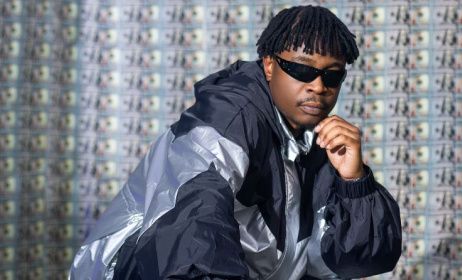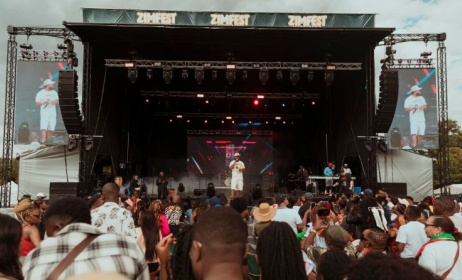Oslo World Festival goes deep into Africa's psyche
Africa arrived in full force at the recently concluded 26th edition of Oslo World Festival in Norway and it’s 2019 theme of Utopia. With stories and sounds that continue to flirt with the idea of perfection in the week since it’s finale, for many it was a first trip to the Nordic region. From the indigenous to the electric; from Niger to South Africa, Uganda, Tanzania, and beyond, sounds from across the continent were not only welcomed to showcase their ingenuity but were given various platforms and venues around the city as well as within the festival seminars throughout the week, to discuss their impact beyond the stage, offering new perspectives from which to witness the diversity of the African world, it’s people and its music. To try to encapsulate each and every performance during this teeming festival would be quite a task – here are some of the highlights from Africa’s stellar contribution.
 Tinariwen. Photo: Helge Brekke
Tinariwen. Photo: Helge Brekke Hibotep. Photo: Helge Brekke
Hibotep. Photo: Helge Brekke Kouame Sereba. Photo: Nuno Pissarra
Kouame Sereba. Photo: Nuno Pissarra Bongeziwe Mabandla. Photo: Mario Henrique
Bongeziwe Mabandla. Photo: Mario Henrique Morena Leraba. Photo: Mario Henrique
Morena Leraba. Photo: Mario Henrique
The opening night event held at the cavernous Folketeateret, dubbed Utopian Lullabies, was led by returning muso Rossy De Palma and featured original works covering the relationship between women as mothers, lovers, friends and childminders, and their lasting impressions on the music we take with us on our journeys. With each woman adorned in her own vibrant colour, the night was a stirring event for both the audience member and artist, and portended to the week’s predominant themes.
Ayo, who did her new role much justice stepping in on behalf of Inna Modja, explained that is was interesting to perform and spectate at the same time: “When you go to these big, grand churches in Paris and you look up, you see angels with trumpets and harps – all musicians. And it makes sense, because music opens doors, corners and gateways. Even though none of these women understand each other’s mother tongues, they understand each other’s music.”
Indicative of the stature of artists chosen for Oslo World’s showcases, it is clear that festival director Alexandra Archetti and her team’s choices were well made. Each artist communicated a message of self-love, acceptance and playfulness while interweaving important issues that speak to the heart of almost every creative force present on this year’s bill. For the rest of the week, delegates and artists were confronted with sessions that enabled them to begin the necessary ideation toward building a manifesto for a better music scene – one that included putting together actions for a world with no racism, equal opportunities between the sexes, gender fluidity, body politics, indigenous language preservation and shifting identities particularly prevalent in a changing continent’s variegating cultures. Tastefully preceding the evening’s concerts, these seminars enabled the attendees to reflect on the sounds they were to hear with new appreciation and understanding.
From one lullaby to the next, Ivorian musician Kouame Sereba reflected on the influence his mother has had on his musical journey throughout the continent, during his performance of 'The Woman Who Sang' at the Black Nordic Theatre, a venue dedicated to black history and decorated with images of iconic figures such as Maya Angelou and Martin Luther King.
“I come from a cousin’s group of 11,” he explains. “My mom always had something to do. What I'm left with now is that she sang. She always sang at home while she was working, and that was the best thing I knew when I was a kid. I found safety in this. This security has been the most powerful tool I've ever had with me when I've travelled out into the big world.”
Oslo World: Open Xpression, also held at the Black Nordic Theatre since its inception in 2010 every third Wednesday, saw the city’s most fervent open-mic stage light up with a string of enthusiastic participants waiting their turn to share their latest offerings; one such Ghanaian-Norwegian vocalist stood out among them. Beatrice Kurmodzie, also known as Akuvi, was accompanied by a full band in a soulful yet light-hearted impromptu performance contemplating love gone awry.
Black Major’s label night saw South Africa’s Eastern Cape-hailing Bongeziwe Mabandla walk the audience of Bla through his own iterations of love, with tracks from the award-winning album Mangaliso. His ability to stand alone onstage, surrounded by silence and the sound of his own guitar strings, shows an intimacy that one can only describe as valiant and unflinching, with percussive and poetic Xhosa lyrics echoing throughout.
Following this was Lesotho’s Morena Leraba, a fairly new act that has fast gained traction globally. By day, vocalist Teboho Mochaoa and producer Steve Hogg (aka Vox Portent) enjoy a somewhat quiet life of sonic exploration and thought, which by night sees the two form the audio iteration of the character of Morena Leraba – a Mosotho shepherd who travels to the far reaches of our sonic imaginations to bring us a trance-like and immersive experience of famo-inspired electronic energy.
“The European perspective of African music will always be that of a certain exoticism,” Mochaoa says. “Maybe then it’s our duty to try to remove that or change that when we travel to places like Norway, and find partnerships that are open to learning about our cultures, so that we can say, 'Hey, we are the same as you. We can borrow from you, and you can borrow from us.' It’s this kind of coming together that keeps all of our contributions to the music world alive.”
Friday night saw the Nyege Nyege family take over Bla for its own label night, with Somali DJ Hibotep, who is set to release her own EP soon, taking the helm of the new wave of African crusaders embracing the self-made future of Africa and it’s music. Alongside her stand Nihiloxica, a seven-piece intertwining the techno-sensibilities of Jacob Maskell-Key and sound designer pq (Pete Jones) along with Bugandan drumming of the Nilotica Cultural Ensemble – a combination that is undeniable. When asked how Nihiloxica experiences new audiences, drumming emcee Spyda responds with strength: “I don’t explain myself. I express myself. There’s no need to explain. We’ve reached a time where no one can tell us who we are, and we decide what kind of Africans we want to be.”
The final day of concerts saw Ifoghas guitarist Bombino return from Niger for yet another performance on the Oslo World stage, paving the way for an equally oasis-like performance by Tinariwen, to tie off this week-long journey across new worlds in one city.
If Oslo World’s manifesto for change is to form the framework of the festival’s coming years, one can only look forward to the next edition with high hopes for music in Africa finding its way back to Norway.

































Comments
Log in or register to post comments